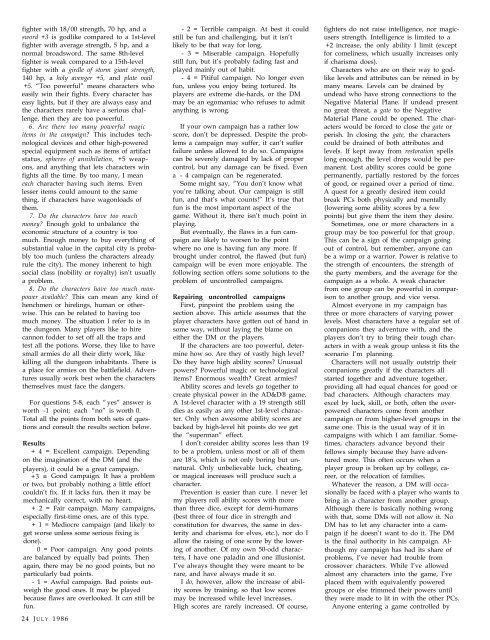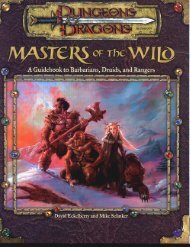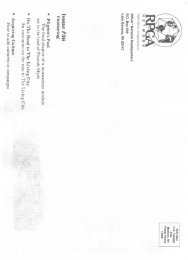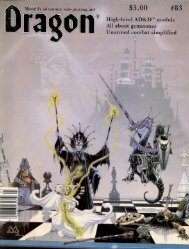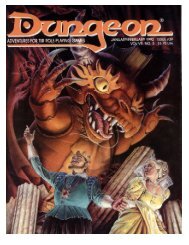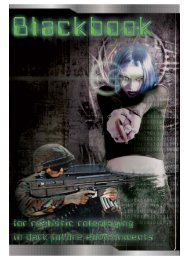Accessory - Dragon Magazine #111.pdf - Index of
Accessory - Dragon Magazine #111.pdf - Index of
Accessory - Dragon Magazine #111.pdf - Index of
You also want an ePaper? Increase the reach of your titles
YUMPU automatically turns print PDFs into web optimized ePapers that Google loves.
fighter with 18/00 strength, 70 hp, and a<br />
sword +3 is godlike compared to a 1st-level<br />
fighter with average strength, 5 hp, and a<br />
normal broadsword. The same 8th-level<br />
fighter is weak compared to a 15th-level<br />
fighter with a girdle <strong>of</strong> storm giant strength,<br />
140 hp, a holy avenger +5, and plate mail<br />
+5. “Too powerful” means characters who<br />
easily win their fights. Every character has<br />
easy lights, but if they are always easy and<br />
the characters rarely have a serious challenge,<br />
then they are too powerful.<br />
6. Are there too many powerful magic<br />
items in the campaign? This includes technological<br />
devices and other high-powered<br />
special equipment such as items <strong>of</strong> artifact<br />
status, spheres <strong>of</strong> annihilation, +5 weapons,<br />
and anything that lets characters win<br />
fights all the time. By too many, I mean<br />
each character having such items. Even<br />
lesser items could amount to the same<br />
thing, if characters have wagonloads <strong>of</strong><br />
them.<br />
7. Do the characters have too much<br />
money? Enough gold to unbalance the<br />
economic structure <strong>of</strong> a country is too<br />
much. Enough money to buy everything <strong>of</strong><br />
substantial value in the capital city is probably<br />
too much (unless the characters already<br />
rule the city). The money inherent to high<br />
social class (nobility or royalty) isn’t usually<br />
a problem.<br />
8. Do the characters have too much manpower<br />
available? This can mean any kind <strong>of</strong><br />
henchmen or hirelings, human or otherwise.<br />
This can be related to having too<br />
much money. The situation I refer to is in<br />
the dungeon. Many players like to hire<br />
cannon fodder to set <strong>of</strong>f all the traps and<br />
test all the potions. Worse, they like to have<br />
small armies do all their dirty work, like<br />
killing all the dungeon inhabitants. There is<br />
a place for armies on the battlefield. Adventures<br />
usually work best when the characters<br />
themselves must face the dangers.<br />
For questions 5-8, each “ yes” answer is<br />
worth -1 point; each “no” is worth 0.<br />
Total all the points from both sets <strong>of</strong> questions<br />
and consult the results section below.<br />
Results<br />
+ 4 = Excellent campaign. Depending<br />
on the imagination <strong>of</strong> the DM (and the<br />
players), it could be a great campaign.<br />
+3 = Good campaign. It has a problem<br />
or two, but probably nothing a little effort<br />
couldn’t fix. If it lacks fun, then it may be<br />
mechanically correct, with no heart.<br />
+ 2 = Fair campaign. Many campaigns,<br />
especially first-time ones, are <strong>of</strong> this type.<br />
+ 1 = Mediocre campaign (and likely to<br />
get worse unless some serious fixing is<br />
done).<br />
0 = Poor campaign. Any good points<br />
are balanced by equally bad points. Then<br />
again, there may be no good points, but no<br />
particularly bad points.<br />
- 1 = Awful campaign. Bad points outweigh<br />
the good ones. It may be played<br />
because flaws are overlooked. It can still be<br />
fun.<br />
24 JULY 1986<br />
- 2 = Terrible campaign. At best it could<br />
still be fun and challenging, but it isn’t<br />
likely to be that way for long.<br />
- 3 = Miserable campaign. Hopefully<br />
still fun, but it’s probably fading fast and<br />
played mainly out <strong>of</strong> habit.<br />
- 4 = Pitiful campaign. No longer even<br />
fun, unless you enjoy being tortured. Its<br />
players are extreme die-hards, or the DM<br />
may be an egomaniac who refuses to admit<br />
anything is wrong.<br />
If your own campaign has a rather low<br />
score, don’t be depressed. Despite the problems<br />
a campaign may suffer, it can’t suffer<br />
failure unless allowed to do so. Campaigns<br />
can be severely damaged by lack <strong>of</strong> proper<br />
control, but any damage can be fixed. Even<br />
a - 4 campaign can be regenerated.<br />
Some might say, “You don’t know what<br />
you’re talking about. Our campaign is still<br />
fun, and that’s what counts!” It’s true that<br />
fun is the most important aspect <strong>of</strong> the<br />
game. Without it, there isn’t much point in<br />
playing.<br />
But eventually, the flaws in a fun campaign<br />
are likely to worsen to the point<br />
where no one is having fun any more. If<br />
brought under control, the flawed (but fun)<br />
campaign will be even more enjoyable. The<br />
following section <strong>of</strong>fers some solutions to the<br />
problem <strong>of</strong> uncontrolled campaigns.<br />
Repairing uncontrolled campaigns<br />
First, pinpoint the problem using the<br />
section above. This article assumes that the<br />
player characters have gotten out <strong>of</strong> hand in<br />
some way, without laying the blame on<br />
either the DM or the players.<br />
If the characters are too powerful, determine<br />
how so. Are they <strong>of</strong> vastly high level?<br />
Do they have high ability scores? Unusual<br />
powers? Powerful magic or technological<br />
items? Enormous wealth? Great armies?<br />
Ability scores and levels go together to<br />
create physical power in the AD&D® game.<br />
A 1st-level character with a 19 strength still<br />
dies as easily as any other 1st-level character.<br />
Only when awesome ability scores are<br />
backed by high-level hit points do we get<br />
the “superman” effect.<br />
I don’t consider ability scores less than 19<br />
to be a problem, unless most or all <strong>of</strong> them<br />
are 18’s, which is not only boring but unnatural.<br />
Only unbelievable luck, cheating,<br />
or magical increases will produce such a<br />
character.<br />
Prevention is easier than cure. I never let<br />
my players roll ability scores with more<br />
than three dice, except for demi-humans<br />
(best three <strong>of</strong> four dice in strength and<br />
constitution for dwarves, the same in dexterity<br />
and charisma for elves, etc.), nor do I<br />
allow the raising <strong>of</strong> one score by the lowering<br />
<strong>of</strong> another. Of my own 50-odd characters,<br />
I have one paladin and one illusionist.<br />
I’ve always thought they were meant to be<br />
rare, and have always made it so.<br />
I do, however, allow the increase <strong>of</strong> ability<br />
scores by training, so that low scores<br />
may be increased while level increases.<br />
High scores are rarely increased. Of course,<br />
fighters do not raise intelligence, nor magicusers<br />
strength. Intelligence is limited to a<br />
+2 increase, the only ability I limit (except<br />
for comeliness, which usually increases only<br />
if charisma does).<br />
Characters who are on their way to godlike<br />
levels and attributes can be reined in by<br />
many means. Levels can be drained by<br />
undead who have strong connections to the<br />
Negative Material Plane. If undead present<br />
no great threat, a gate to the Negative<br />
Material Plane could be opened. The characters<br />
would be forced to close the gate or<br />
perish. In closing the gate, the characters<br />
could be drained <strong>of</strong> both attributes and<br />
levels. If kept away from restoration spells<br />
long enough, the level drops would be permanent.<br />
Lost ability scores could be gone<br />
permanently, partially restored by the forces<br />
<strong>of</strong> good, or regained over a period <strong>of</strong> time.<br />
A quest for a greatly desired item could<br />
break PCs both physically and mentally<br />
(lowering some ability scores by a few<br />
points) but give them the item they desire.<br />
Sometimes, one or more characters in a<br />
group may be too powerful for that group.<br />
This can be a sign <strong>of</strong> the campaign going<br />
out <strong>of</strong> control, but remember, anyone can<br />
be a wimp or a warrior. Power is relative to<br />
the strength <strong>of</strong> encounters, the strength <strong>of</strong><br />
the party members, and the average for the<br />
campaign as a whole. A weak character<br />
from one group can be powerful in comparison<br />
to another group, and vice versa.<br />
Almost everyone in my campaign has<br />
three or more characters <strong>of</strong> varying power<br />
levels. Most characters have a regular set <strong>of</strong><br />
companions they adventure with, and the<br />
players don’t try to bring their tough characters<br />
in with a weak group unless it fits the<br />
scenario I’m planning.<br />
Characters will not usually outstrip their<br />
companions greatly if the characters all<br />
started together and adventure together,<br />
providing all had equal chances for good or<br />
bad characters. Although characters may<br />
excel by luck, skill, or both, <strong>of</strong>ten the overpowered<br />
characters come from another<br />
campaign or from higher-level groups in the<br />
same one. This is the usual way <strong>of</strong> it in<br />
campaigns with which I am familiar. Sometimes,<br />
characters advance beyond their<br />
fellows simply because they have adventured<br />
more. This <strong>of</strong>ten occurs when a<br />
player group is broken up by college, career,<br />
or the relocation <strong>of</strong> families.<br />
Whatever the reason, a DM will occasionally<br />
be faced with a player who wants to<br />
bring in a character from another group.<br />
Although there is basically nothing wrong<br />
with that, some DMs will not allow it. No<br />
DM has to let any character into a campaign<br />
if he doesn’t want to do it. The DM<br />
is the final authority in his campaign. Although<br />
my campaign has had its share <strong>of</strong><br />
problems, I’ve never had trouble from<br />
crossover characters. While I’ve allowed<br />
almost any characters into the game, I’ve<br />
placed them with equivalently powered<br />
groups or else trimmed their powers until<br />
they were made to lit in with the other PCs.<br />
Anyone entering a game controlled by


